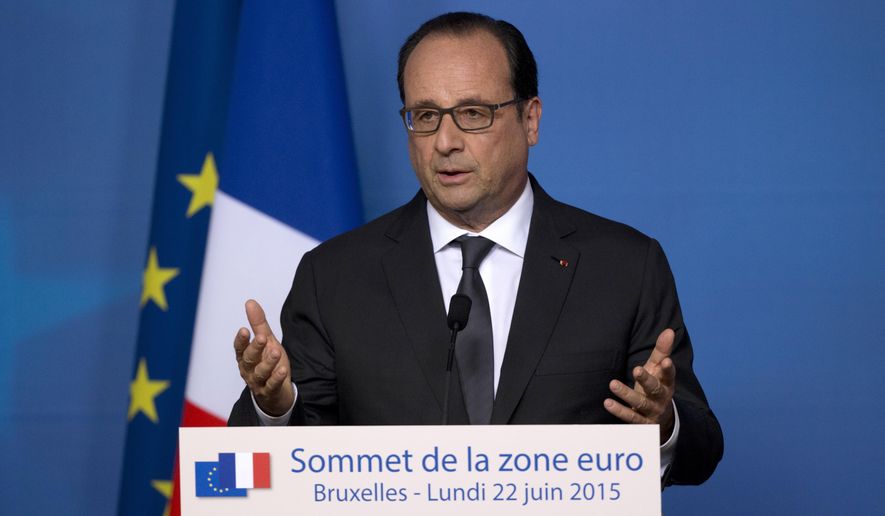The Obama administration scrambled Wednesday to defuse another international flap over U.S. snooping programs, this time with France amid new allegations that the National Security Agency eavesdropped on the private conversations of French President Francois Hollande and two of his predecessors.
Furious French officials called U.S. Ambassador Jane Hartley to the French Foreign Ministry to answer questions about the snooping, which was revealed late Tuesday by the rogue hacking organization WikiLeaks and allegedly took place between 2006 and 2012, though there are indications it may have gone on longer. French leaders said the incidents could damage long-standing relations between the U.S. and France, key allies in nuclear negotiations with Iran and on other vital international issues.
President Obama personally called Mr. Hollande and reassured him that the U.S. is not and will not spy on his communications. But the White House, as it has done with previous such allegations, refused to say whether it has ever listened in on Mr. Hollande’s calls.
In Paris, officials said the U.S. is falling short of the promises it made to curtail surveillance of close allies.
“Commitments were made by our American allies. They must be firmly recalled and strictly respected,” Prime Minister Manuel Valls said. “Being loyal doesn’t mean falling into line.”
The conversations in question involved Mr. Hollande and his two predecessors, Nicolas Sarkozy and Jacques Chirac.
SEE ALSO: Congress approves Obama trade powers
The Liberation newspaper, which partnered with WikiLeaks to publish the latest NSA revelations, reported that the top floor of the U.S. Embassy in Paris was filled with spying equipment tucked behind painted windows. From that facility, the paper said, the NSA was able to listen in on conversations in the Elysee Palace, the French executive mansion.
French government officials stressed that their country does not spy on the U.S. government, and they want similar assurances from the White House. Mr. Hollande reportedly will send his top intelligence officers to the U.S. in the coming days to meet with Obama administration officials.
Mr. Obama didn’t directly address the issue Wednesday but the White House circulated a readout of his conversation with Mr. Hollande.
“President Obama spoke this morning with President Francois Hollande of France. The president affirmed our unwavering commitment to the bilateral relationship, including our ongoing close cooperation in the intelligence and security fields,” the White House said. “The president reiterated that we have abided by the commitment we made to our French counterparts in late 2013 that we are not targeting and will not target the communications of the French president.”
Mr. Hollande characterized the call slightly differently. He said Mr. Obama promised to stop spying tactics considered “unacceptable between allies,” The Associated Press reported.
Speaking in Paris Wednesday, Mr. Hollande said French leaders should speak out against such surveillance whatever their political persuasion.
SEE ALSO: Mike McCaul to float bill to counter homegrown terrorism
“What you want from a friendly country is a guarantee that such practices have ceased,” he said.
The U.S. side was anxious to contain the diplomatic fallout. France has been a critical — and at times skeptical — partner in Mr. Obama’s drive for a nuclear deal with Iran, and Mr. Hollande will play host to a major U.N. climate change conference to be held in Paris at the end of the year.
Accusations of spying on allies are nothing new for this administration. The NSA — and Mr. Obama personally — previously have come under fire for allegedly spying on German Chancellor Angela Merkel’s personal cellphone, revelations that caused a brief but serious rift between the two countries and remains a sore topic in Berlin.
Reports also surfaced of NSA spying on the leaders of Brazil, Mexico and other nations. The allegations came to light following the now-infamous leaks from former NSA contractor Edward Snowden.
Following that, the U.S. promised France, Germany and other allies that NSA snooping on foreign leaders would cease.
Later Wednesday, White House press secretary Josh Earnest stressed that the U.S. only conducts spying operations in connection with terrorist activity or other threats.
“We’ve been very clear that foreign intelligence activities are only conducted when there is a specific, validated national security interest involved. That is true both when it comes to the leader of the country but also when it comes to the citizens of the country,” he told reporters.
⦁ This article is based in part on wire service reports.
• Ben Wolfgang can be reached at bwolfgang@washingtontimes.com.




Please read our comment policy before commenting.